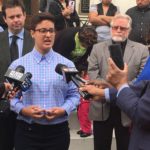By Maureen Smith
JACKSON – Pastors, attorneys, immigrants and immigrants’ advocates gathered at City Hall Wednesday, March 1, to express their concerns about recent immigration raids, seek dialogue with law enforcement representatives and invite the community at large to attend a forum to discuss the contributions immigrants make to Mississippi.
Immediately after the news conference, one of the immigrants who spoke at it was detained by U.S. Immigration and Customs Enforcement (ICE) agents.

Daniela Vargas speaks at a press conference on the steps of the Jackson City Hall. Vargas spoke as a DACA recipient whose father and brother face possible deportation. Immediately after the news conference, federal officers took her into custody. (Photo by Tereza Ma.)
Daniela Vargas is a 22-year-old Argentine native, but America is the only home she has ever known. She was covered under the Deferred Action for Childhood Arrivals (DACA) program, but those applications have to be renewed every two years. She reapplied late because she had trouble getting together the money for the application, so her coverage had lapsed. The car in which she was riding was pulled over by federal agents as she left.
This was not her first run-in with ICE. Agents arrested her father and brother at her home earlier this year while she hid in a closet. ICE agents eventually raided the house and detained her for a short time, but released her when she indicated that she had reapplied for DACA. Her father and brother are awaiting deportation hearings.
“When I was seven-years-old my parents sacrificed everything they had ever known to bring my brother and I into the country to establish a better lifestyle. Both my parents began working in poultry plants where most days the cold was unbearable,” she said at the news conference. “Knowing that they were making this sacrifice for us, I put in all my efforts into my education and my talents. I dream of being a university math professor, but now I am not so sure my dream will develop,” Vargas added.
Nathan Elmore represents Vargas. He said her case is a complicated one, but he knows ICE has discretion in its cases and he hopes agents will exercise it. Vargas, he pointed out, does not fall under the ‘priority deportations’ outlined by the Trump administration. She has no criminal record, she is eligible for a DACA renewal and she was not committing a crime when she was picked up.
Bishop Joseph Kopacz wrote a letter in support of Vargas saying, “Some have expressed grave concern at every level of government and society that DACA recipients may be especially vulnerable in the transition from one administration to the next, but President Trump has stated that he will honor the status of all DACA recipients. I would hope that local branches of our Immigration and Customs Service will uphold the letter and spirit of the law with respect to the legal status of DACA recipients.”
ICE executed a series of raids in the state Wednesday, Feb. 22, detaining 55 people, according to the Clarion-Ledger. The raids targeted Asian restaurants in Jackson, Flowood, Pearl and Meridian and officials said they were the result of a yearlong investigation and not part of any new effort to round up undocumented immigrants.
Elmore is also representing some of the people being detained in the restaurant raids. He said he has been searching the court database to find out if his clients have been charged or appeared before a judge, but even a week after the raid, he can find no record of them anywhere.
Elmore said the current atmosphere in the immigrant community is one of fear, especially among families with children. “This weekend me and several members of my law firm went to Morton, Mississippi, where we did an outreach event where we talked to people just like Daniela. These folks were scared. They’re worried that ‘what if I get picked up, who’s going to take care of my child?’ That was the number one question that we faced as we talked to these people … and that’s a hard question for me to answer for them,” he said.

Amelia McGowan, attorney for the Catholic Charities
Amelia McGowan, attorney for the Catholic Charities Migrant Resource Center, echoed that sentiment. “Often a topic that goes undiscussed (is that) many immigrants who come to the United States – documented or undocumented – do have U.S. citizen children, or perhaps who are not citizens, but who have lived their entire lives here in the United States. Forced immigration raids not only puts the children in immediate danger of potentially removing their parents, removing their caregivers from the United States, but it also places them in a constant state of fear, which can re-traumatize them if they have suffered a traumatic past from their home countries,” said McGowan.
Redemptorist Father Michael McAndrew agrees. He has been advocating for immigrant families across the U.S. for almost three decades. Today, he is part of a Redemptorist community in Greenwood, Miss., serving the Hispanic community throughout the Mississippi Delta. He pointed out that deportation is more complicated than it may seem when children are involved.
“Of course, immigration law states that citizen children can remain in this country, but the rights of children must protect more than just the children’s right to be here. A more important right of the child is to be raised by his or her parents when their parents are not abusive or doing harm to them,” said Father McAndrew.
The last speaker, Jim Evans, president of the Mississippi Immigrants Rights Alliance (MIRA), brought the gospel to bear in his challenge to state leaders and members of the faith community. “The gospel of Jesus Christ speaks to these suffering in our midst – not as who they are but as who we are and how we attend to them don’t establish who they are, but it makes it clear and reveals who we are,” he said.
The news conference was organized by the Latin American Business Association, ONE Church and MIRA. The group still hopes to host a community forum to showcase the contributions immigrants make to Mississippi and open a dialogue with local law enforcement departments. The forum is set for Tuesday, April 11, at 6 p.m., at Fondren Church on State Street in Jackson.
